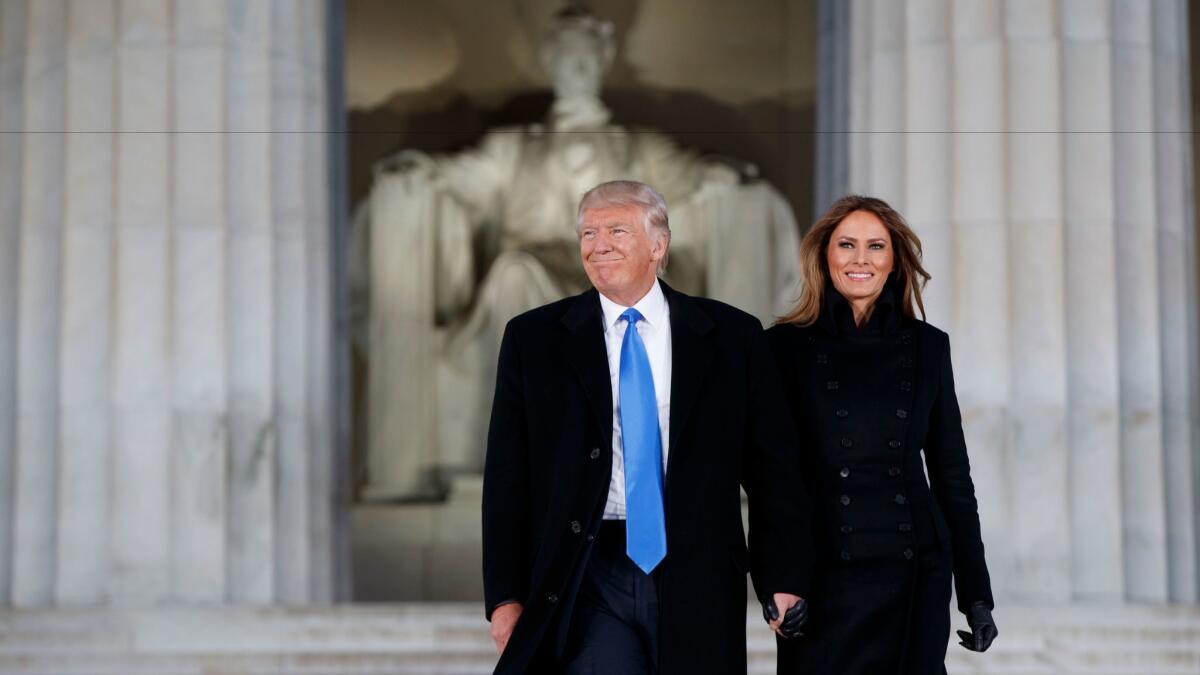Trump’s unlikely presidential run culminates today, but divisions across nation persist
- Share via
Reporting from Washington — The man who won the presidency by smashing nearly every convention in politics will embark on one of the most solemn and sober rituals in American democracy Friday, a peaceful transfer of power culminating with Donald Trump assuming the presidency that few thought was within his grasp.
None of the gut-check moments along the way — winning his first primary, the Republican nomination and the election itself — has mellowed Trump’s behavior. His refusal to conform to political norms helped him attract millions of voters who felt disconnected from coastal power centers and eager to see a leader unafraid of offending people. Trump referred again to those voters, “the forgotten man and the forgotten woman,” as he thanked supporters during a celebration concert Thursday night overlooking the Washington Monument.
His unconventional qualities — and a promise to bring back jobs lost to outsourcing and automation — helped Trump compile a historic electoral upset in which he defeated 16 primary opponents and trampled both the Bush and Clinton family political dynasties. The business mogul who will become the first president lacking both government and military service will share the stage Friday with another target, President Obama, whose legacy was at the center of Trump’s attacks.
But Trump lost the popular vote to Democratic rival Hillary Clinton by more than 2.8 million, and he has failed to build support from skeptics who see his presidency as divisive and even dangerous.
During the transition period, something other modern presidents have used to mend wounds from bitter elections, Trump has sparred with enemies and inflamed old divisions. He held victory rallies in states that helped win him the election and continued to criticize Clinton in public appearances weeks after she faded into the woods of New York for long walks.
That lingering sense of grievance, combined with resentment from Democrats amid a period of heightened polarization in the country, has helped Trump secure an ignominious distinction as he prepares to take the oath of office. His approval rating is lower than that of any incoming president in decades, according to polls.
As Trump takes the oath of office from Supreme Court Chief Justice John G. Roberts Jr., he is expected to face thousands of protesters, followed by a wave of marchers Saturday who are coming to Washington to celebrate women’s rights and register disapproval of Trump. Attendance at the swearing-in is expected to be between 700,000 and 900,000, or about half the size of the crowds attracted by Obama in 2009, according to the Department of Homeland Security. Rain is forecast.
Trump has nonetheless insisted he will attract record crowds. He has reacted defensively as liberal politicians said they would not attend and such big-name entertainers as Elton John rejected requests to perform.

President-elect Donald Trump and wife Melania at the Lincoln Memorial in Washington on Thursday.
He accused Rep. John Lewis, a Georgia Democrat and civil rights icon brutally beaten in the march on Selma, Ala., half a century ago, of being “all talk” and “no action” after Lewis said he would skip the inauguration because he did not consider Trump a legitimate president.
Trump’s aides have tried to tamp down some of the controversy around the inauguration no-shows, saying interest in the event has been overwhelming.
“When you wake up on Friday and see the enormous crowds that are there, you’re going to recognize that it is going to be an inauguration for all Americans,” spokesman Sean Spicer told reporters this week. “Obviously, we’d love for every member of Congress to attend, but if they don’t, that’s some great seats that other folks can hopefully partake in.”
Trump promised to bridge divides.
“There’s never been a movement like this, and it’s something very, very special. And we’re going to unify our country,” he said Thursday at the concert.
Then, after prompting the crowd to chant his “Make America great again” slogan, he promised: “We’re going to make America great for all of our people — everybody. Everybody throughout our country. That includes the inner cities; that includes everybody.”
Spicer downplayed expectations for Trump’s first day in office, saying that of the four or five executive orders he will sign, some would be logistical measures designed to keep the government operating and protect the first family. He promised more extensive measures on immigration, energy, crime and terrorism, starting Monday and throughout Trump’s first weeks in office.
Allies couch Trump’s combativeness as part of his appeal — a challenge to the Washington establishment that has frustrated Americans of all stripes.
“As a new incoming president, he should challenge everything,” said Corey Lewandowski, Trump’s former campaign manager, who is now a lobbyist and television commentator. “He is looking at Washington, D.C., with a fresh set of eyes and I think that’s always critically important because he has the ability to come in and see things that others do not see because they’ve been blinded by the D.C. Beltway mentality.”
But even as Trump rode to electoral victory by exploiting that anger, he has been unable to persuade most Americans to join him.
Just 40% of Americans hold a favorable impression of Trump, according to a Washington Post-ABC News poll released this week. That’s lower than the approval ratings for Presidents George W. Bush (62%), George H. W. Bush (65%), Obama (79%), Reagan (58%) and Carter (78%) before their inaugurations.
Yet those ratings demonstrate another truth: Popularity at the beginning of a term does not always correlate with success at the end. Carter and George H.W. Bush lasted just one term. And Reagan, whose lower approval numbers came closest to Trump’s, became one of the most beloved presidents in recent history.
Twitter: @noahbierman
More to Read
Sign up for Essential California
The most important California stories and recommendations in your inbox every morning.
You may occasionally receive promotional content from the Los Angeles Times.











